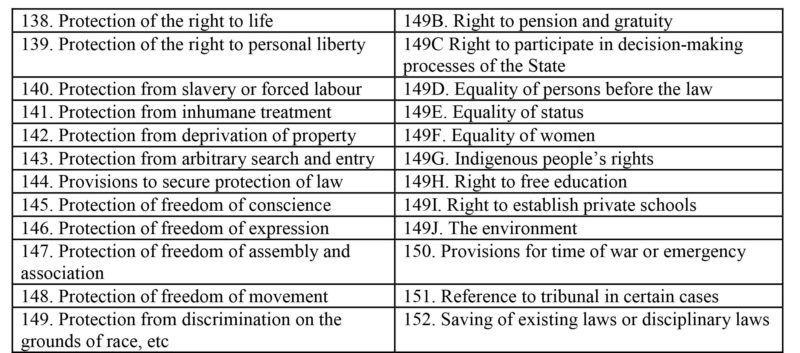Dear Editor,
There was an article in the newspapers that the Working People’s Alliance (WPA) is disappointed constitutional reform has not proceeded in spite of a promise outlined in the APNU+AFC Manifesto. An area of promise is that, “The new Constitution will put the necessary checks and balances in place to consolidate our ethos of liberal democracy. Freedom of speech, reduction of the power of the President and the Bill of Rights will be enshrined in the document.”
How more ridiculous can this statement be. For starters, freedom of expression is already enshrined at Article 146. The gut-feeling approaches to governance, running for office to represent the people’s interests, and refusing to take the time to become acquainted with the laws, rules, principles and procedures guiding such serious business is disturbing.
We have to start holding the politicians accountable for the things they say and demand that they provide the evidence to back up the vacuous statements they keep making. Unless this is done they will continue to make fools of the masses. The Bill of Rights they talk about is only about throwing around nice sounding terms to mislead the society into thinking that they know what they are talking about.
The United States Constitution has ensconced ten amendments, aka The Bill of Rights. These are Freedom of speech; religious freedom; the right to bear arms; protection from soldiers living in your house and conditions under how they can; no arbitrary search of a house; a house search allowed with a proviso; the right to trial; the right to a jury in a civil case; reasonable bail and fine and protection from cruel and unusual punishment; the rights of an individual state to self-determination. It is advised these amendments were put in place to ensure a greater protection for personal liberties and give specific prohibitions on government power.
Title 1 in the Guyana Constitution ‘Protection of Fundamental Rights and Freedoms of the Individual’ is Guyana’s ‘Bill of Rights’ in the undermentioned Articles
In examining these rights and freedoms (i.e. liberties) the politicians must tell the society what Bill of Rights they have in mind. With what is existing what is needed is legislation to deepen and strengthen their protection, including judicial recourse to deal condignly with the politicians who are depriving us of what’s constitutionally enshrined.
Guyana is a republic and its president has executive authority. The president is the head of state and head of government. We must begin talking about these important aspects of our national ethos and arrive at common understanding of the role and responsibility of the office holder and people. In a republic the rights of the majority and minorities are assured.
Article 13, which represents the principal political objective of the society, expressly lays out following the path of “inclusionary democracy” and the rights articles assure the equality and protection of all. Unlike our Caribbean counterparts Guyanese answer to no external authority; that authority is vested in the people, via the constitution, to hold elected leaders accountable. We are the final arbiters of our destiny.
The United Nations in its report on proceeding with constitutional reform underscores the importance of a deliberative approach, including public education. That education must begin with those demanding reform, for clearly they are stumbling around in the dark, posing a clear and present threat to our rights (liberties) and the nation’s sovereignty.
In order to reform there must first be understanding of the issues. There cannot be meaningful reform of what is not known, understood, or given a chance to work. The supporting mechanisms must be put in place to make the constitution work. Enough of holding the constitution hostage to egos, ignorance, and compulsion to settle political scores.
Yours faithfully,
Lincoln Lewis











